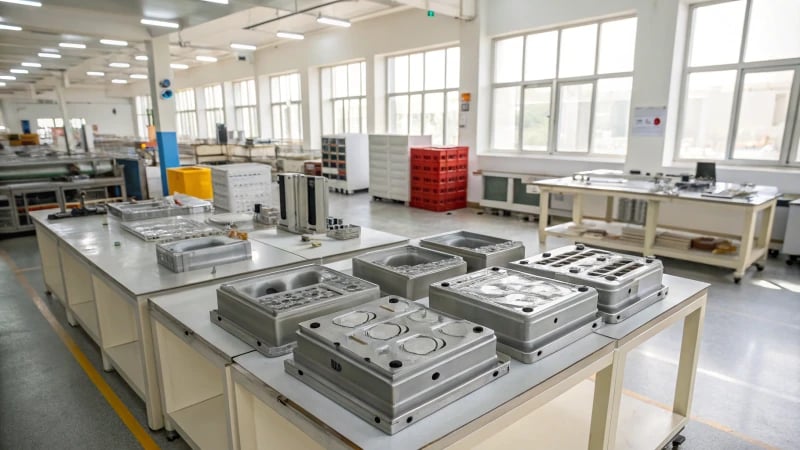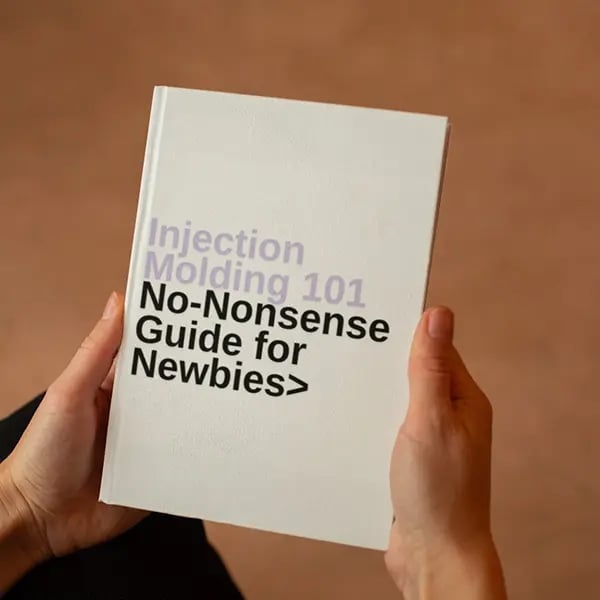
Discovering top-notch plastic molds often seems like trying to find a needle in a haystack. But the right approaches really turn it into an exciting and adventurous journey!
To find high-quality plastic molds, define your product needs, evaluate manufacturers’ strengths and design plans, understand their processes, and consider after-sales support to ensure a reliable production partner.
I remember when I first started looking for molds; it was confusing! I needed to learn quickly. First, people must clarify their needs – like knowing the exact details of their product. For example, I once needed to list details like size and wall thickness for a project. Having these details boosted my confidence when I evaluated manufacturers.
Next, you must examine the manufacturer’s strengths. Checking their size and technical team was critical for me. Reviewing their mold design plans is very important. It’s like having a solid blueprint before building a house. Understanding their manufacturing processes and quality checks really helped my projects!
Clarifying product needs is essential for finding quality molds.True
Clearly defining your product requirements helps identify suitable manufacturers and ensures the molds meet your specifications, leading to higher quality outcomes.
After-sales support is irrelevant in mold manufacturing.False
After-sales support is crucial as it ensures ongoing assistance and maintenance, which can impact the longevity and performance of the molds produced.
- 1. What Factors Should You Consider When Defining Your Mold Requirements?
- 2. How Can You Effectively Assess a Manufacturer’s Experience and Reputation?
- 3. What Are the Key Elements of a Successful Mold Design Plan?
- 4. How Do Manufacturing Processes Impact the Quality of Plastic Molds?
- 5. Why Is After-Sales Support Important for Your Mold Production?
- 6. Conclusion
What Factors Should You Consider When Defining Your Mold Requirements?
Defining your mold requirements involves more than just numbers and specifications. You need to understand your unique needs. It’s also about the details and subtleties connected to them. Let’s explore what truly matters in this process.
When defining mold requirements, consider product details, batch size, material properties, manufacturer’s reputation, mold design, manufacturing processes, customer feedback, and after-sales service. Each factor is crucial for ensuring high-quality production.

Clear Your Own Needs
When defining your mold requirements, it’s crucial to start with a clear understanding of your needs.
-
Determine Product Specifications and Precision Requirements: Once, I had to list specifications for a new line of consumer electronics. It wasn’t just about size; the wall thickness and appearance also needed to meet brand standards. Precision matters a lot, especially for intricate components.
-
Production Batch Size: Production scale greatly affects mold choice. When producing large batches, wear resistance and stability become very crucial. Small batches need flexibility, but too much of it can reduce quality.
-
Material Properties: Each plastic behaves differently in the molding process. Understanding its fluidity and shrinkage is crucial. Materials have unique traits that can affect the product. Manufacturers familiar with your chosen materials will probably optimize the design process.
Evaluate the Strength of the Manufacturer
Choosing the right manufacturer is like picking a dance partner; you need them to know the steps.
- Investigate Scale and Qualifications: I prefer established manufacturers with a strong track record. Certifications like ISO9001 reassure me of their quality commitment. A simple table can summarize key qualifications:
| Manufacturer Name | Years in Business | Certifications | Production Capacity |
|---|---|---|---|
| Manufacturer A | 15 | ISO9001 | High |
| Manufacturer B | 10 | ISO9001, ISO14001 | Medium |
-
Technical Team’s Strength: A skilled design team is vital. I assess their expertise with advanced mold design software. It’s like knowing how an artist masters their brush.
-
Production Equipment Conditions: Equipment quality counts! Seeing cutting-edge machines during visits showed me their impact on mold quality.
Review Mold Design Plan
Thoughtful mold design requires careful planning.
-
Evaluate Design Rationality: Good design includes all structural details, like demolding methods and cooling systems. I always request detailed design evaluations.
-
Pay Attention to Design Details: Overlooking small details, like parting surfaces, once led to defects. I now ensure every aspect, from surfaces to cooling design, is checked.
Investigate Manufacturing Process and Quality Control
Understanding the process and quality control is essential.
-
Manufacturing Process Level: Investigating precision control reveals a facility’s commitment to high standards. Better processes extend mold lifespan.
-
Quality Control Measures: Knowing how manufacturers check quality is crucial. A traceability system helps fix issues quickly. I look for standardized inspections and reports.
Reference Cases and Customer Reviews
Learning from others’ experiences offers valuable insights.
-
Successful Cases: I ask for similar project examples. Seeing working molds boosts my confidence in their abilities.
-
Customer Feedback: Gathering reviews helps understand a manufacturer’s reputation. Online searches and industry contacts guide me.
Consider After-Sales Service
Good support after a sale separates great manufacturers.
-
Technical Support Capabilities: Problems may arise anytime, so technical support availability is reassuring. I confirm there’s a dedicated team for assistance.
-
Response Speed: Quick responses matter when issues occur; delays can cause meaningful production downtime.
-
Spare Parts Supply Guarantee: Ensuring spare parts are consistently available reduces maintenance time and keeps production running smoothly.
Product specifications are crucial for mold selection.True
Understanding product specifications ensures you choose a mold manufacturer that meets your precision and quality requirements, vital for successful production.
All manufacturers provide the same quality of molds.False
Not all manufacturers have the same level of expertise or equipment, which affects mold quality; thorough evaluation is necessary.
How Can You Effectively Assess a Manufacturer’s Experience and Reputation?
Finding the right manufacturer can feel really overwhelming. I remember being in that situation. Selecting the right partner is important. Here are some sincere strategies that helped me check their experience and reputation.
To effectively assess a manufacturer’s experience and reputation, clarify your product needs, examine their history and certifications, review case studies and customer feedback, and evaluate the quality of their after-sales services.

Clear Your Own Needs
Before assessing a manufacturer, it’s vital to clarify your own requirements. Understanding product specifications and precision standards helps you filter manufacturers effectively.
- Product Specifications: List specifics such as size, shape, and tolerances.
- Production Batch Size: Consider whether you’re doing large-scale or small-batch production.
For instance, a large batch may necessitate a mold with high wear resistance and stability. You can explore more about this process in our guide on batch production strategies1.
Evaluate the Strength of the Manufacturer
Understanding the manufacturer’s capabilities can directly impact your project.
| Criteria | Details |
|---|---|
| Enterprise Scale | Larger companies typically have better systems and equipment. |
| Qualifications | Look for certifications like ISO9001 to gauge quality management. |
| Technical Team | Assess the expertise and experience of the design and manufacturing teams. |
Advanced equipment ensures precision; investigate if they have high-precision CNC machines, for instance. Find out more on manufacturing technology2.
Review Mold Design Plans
A solid mold design is essential for product quality. Evaluate various aspects:
- Design Rationality: Ensure that the mold design considers structural characteristics and cooling systems.
- Detail Orientation: Look at the parting surface design and ensure that ejector mechanisms are effective.
Inquire if the manufacturer can provide detailed design plans for assessment, enhancing your confidence in their capabilities. Learn more about mold design principles3.
Investigate Manufacturing Process and Quality Control
Understanding the processes a manufacturer employs can illuminate their operational strengths.
- Process Level: Ask about precision controls and surface treatments used in production.
- Quality Control: Verify if they have rigorous quality assurance protocols in place.
You might find it useful to check if they maintain standardized inspection records. To delve deeper, refer to our resource on quality control measures in manufacturing4.
Reference Cases and Customer Reviews
Real-world examples and feedback can provide insight into a manufacturer’s reliability.
- Successful Cases: Request examples of similar molds produced in the past.
- Customer Reviews: Utilize online platforms to gather feedback from previous clients.
This approach not only verifies quality but also uncovers potential red flags. For further guidance, see our tips on gathering customer feedback5.
Consider After-Sales Service
After-sales support is crucial for long-term partnerships.
- Technical Support: Ensure they provide timely assistance for any issues post-purchase.
- Response Speed: Gauge how quickly they react to service requests.
- Spare Parts Supply: Confirm their ability to provide spare parts long-term.
Understanding these aspects can mitigate future complications. Explore more on after-sales service importance6.
Clarifying product needs is essential before assessing manufacturers.True
Understanding your requirements helps filter manufacturers effectively, ensuring they meet your specific product specifications.
Customer reviews are irrelevant in assessing a manufacturer's reputation.False
Customer feedback provides valuable insights into a manufacturer's reliability and quality, making it crucial for evaluation.
What Are the Key Elements of a Successful Mold Design Plan?
Ever felt puzzled by the details of mold design? Many people do! Knowing what actually creates a successful mold design plan really matters in improving manufacturing processes. Let’s explore this area together!
A successful mold design plan includes clear product details, evaluating manufacturer capabilities, reviewing the design, investigating processes, checking customer reviews, and ensuring reliable after-sales service.

Understand Your Own Requirements
I found it crucial to clearly know my requirements for a successful mold design plan. It’s like setting a map for a journey. Without a destination, you risk getting lost. Consider the following:
- Product Specifications: I always note the size, shape, wall thickness, and tolerance range of the plastic products. This clarity helps me find manufacturers who very likely meet these precise standards.
- Production Batch Size: Is it large or small? Understanding this helps in selecting durable and efficient molds. Larger productions probably need molds built to last longer. Small-batch productions allow some flexibility between cost and quality.
Assess Manufacturer’s Capabilities
I learned that evaluating potential mold manufacturers is important. A complete evaluation really saves you from future costly errors.
- Scale and Qualifications: Established manufacturers usually have more experience and better tools. I check their certifications, like ISO9001, to understand their quality assurance.
- Technical Team’s Expertise: I look at the technical team’s skills. A skilled team familiar with modern mold design software probably optimizes your designs effectively.
- Production Equipment Condition: Checking if they have high-precision CNC machines and other crucial equipment is essential for quality mold production. It really makes all the difference!
Review the Mold Design Plan
A well-planned mold design is important for successful production. It should include various structural aspects:
- Design Rationality: The design should address all structural features of plastic products, cooling systems, and demolding methods must be very clear. Getting a detailed plan for professional evaluation is now a standard step for me.
- Attention to Design Details: Inspect parting surfaces and cooling channels. Good design increases production efficiency and reduces defects, which is always my goal.
Understand the Manufacturing Process and Quality Control
Understanding the manufacturing process is crucial for quality mold standards:
- Manufacturing Process Level: I ask about processing techniques and precision control measures. Learning about modern technologies used in production really helps.
- Quality Control Measures: A strong quality control system is crucial. I seek a manufacturer with a good process for timely problem detection and resolution.
Learn from Reference Cases and Customer Reviews
Past successes guide my decisions:
- Successful Cases: I request case studies of past projects similar to mine. On-site inspections, if possible, are invaluable for insights into their capabilities.
- Customer Reviews: Feedback from other clients is enlightening. Platforms like industry exhibitions or online reviews give a clearer picture of a manufacturer’s service and product quality reputation.
Consider After-Sales Service
Reliable after-sales support is just as important as the initial product quality:
- Technical Support Capabilities: I confirm whether the manufacturer offers ongoing technical support to solve issues during mold use.
- Service Response Speed: Quick response times are very crucial! Downtime can be really costly!
- Spare Parts Supply Guarantee: Knowing they provide consistent spare parts supply means fewer future headaches.
Reflecting on my journey in mold design, I’ve realized these steps make processes smoother and lead to successful outcomes. With these guidelines, you’re well-prepared to tackle your next mold design project with confidence!
Defining product specifications is crucial for mold design success.True
Clear product specifications help identify suitable mold manufacturers and ensure precision in production.
After-sales service is irrelevant to mold design plans.False
Reliable after-sales support is essential for addressing issues and minimizing downtime during production.
How Do Manufacturing Processes Impact the Quality of Plastic Molds?
Ever thought about how the path from an idea to a complete plastic mold affects its quality? The steps of manufacturing play a big role in this. These processes shape not only molds but also the products we use daily.
Manufacturing processes impact plastic mold quality through precision, durability, and finish. Key factors include machining techniques, material choice, quality control, and design decisions.

Understanding the Manufacturing Process
I entered the world of plastic mold manufacturing and felt amazed. Each small detail in the process matters a lot and can affect the final product. It’s similar to cooking. If you miss a key ingredient or overcook, the dish turns out wrong. Each step in mold production – from design to creation – plays a vital role. It helps what we create become functional, durable and also nice to look at.
CNC machining is a good example. The precision this technology offers is amazing. It’s like having a superpower for mold-making! In my early days, we bought CNC machines. Suddenly, we could create designs that were hard to imagine before. The first time we made a mold with complex designs was magical. It was perfect.
Key Manufacturing Processes Affecting Mold Quality
Several key manufacturing processes greatly influence the quality of plastic molds. Each process contributes in a unique way. Understanding these processes is crucial. The right choice probably saves time and resources. It also improves the final product’s quality.
| Process | Impact on Quality |
|---|---|
| CNC Machining | High precision and intricate designs possible |
| Injection Molding | Affects the final product’s surface finish and strength |
| EDM (Electrical Discharge) | Ideal for complex shapes, enhances detail |
| Heat Treatment | Improves hardness and wear resistance |
For more advanced techniques, check out advanced machining techniques7.
Quality Control Measures in Manufacturing
Quality control acts as the safety net in our production. It guarantees that every mold we create meets high standards. From my experience, strong quality control measures bring big differences. Here’s what I always suggest:
- Regular inspections at different stages catch defects early.
- Standardized testing protocols keep our molds consistent and reliable.
- Using technology like 3D scanning8 gets precise measurements.
Importance of Material Selection
Choosing the right materials is like picking the best ingredients for a recipe. At first, I didn’t realize how much material choice affects mold performance. High-grade steel usually tops my list. This is especially true for situations with high-volume production.
- Material properties such as hardness and thermal stability should be evaluated carefully to select appropriate materials for specific molding applications.
Designing for Manufacturability
Design brings creativity and function together. A smart design prevents future problems. I remember a project where we ignored the cooling system design; this led to warping during production—it was a hard lesson! Consider these key points:
- Cooling system design must allow even temperature distribution during molding to avoid defects.
- Ejector mechanisms need to enable smooth part removal without harming the product.
Taking time to analyze these aspects leads to higher quality molds which result in higher quality plastic products. For effective design strategies, see mold design principles9.
In conclusion, understanding how manufacturing processes affect mold quality is crucial. By thinking about each step carefully—from material selection to design and quality control—we guarantee our molds meet aesthetic and functional needs.
CNC machining enhances the precision of plastic molds.True
CNC machining significantly improves the dimensional accuracy of plastic molds, ensuring they meet tight tolerances and high-quality surface finishes.
Material selection has no effect on mold durability.False
The choice of materials directly influences the performance and longevity of molds, making material selection crucial for durability in production.
Why Is After-Sales Support Important for Your Mold Production?
Did you ever feel confused after buying something, not sure if help would come when needed? Many people experience this concern with after-sales support in mold production. This help is very important for both manufacturers and customers. It really matters.
After-sales support in mold production ensures customer satisfaction and loyalty by providing technical assistance, quick problem resolution, and guaranteed spare parts supply, keeping operations smooth.

After-sales support plays a crucial role in mold production, impacting not only the operational efficiency but also customer satisfaction and loyalty. Understanding its importance can lead to enhanced business performance.
Enhancing Customer Satisfaction
Good after-sales support feels like a warm hug after stress. It makes customers feel valued. When molds have problems, having fast and helpful technical support matters. They listened, solved the issue and reduced downtime. Customers ended up happy.
For example, if a customer faces a malfunction with a mold, having a responsive technical support team can help them troubleshoot and resolve the issue swiftly. This translates into improved operational efficiency.
Building Long-term Relationships
Strong after-sales service fosters long-term relationships with customers. Think about your favorite stores or brands. What draws you back to them? For me, it’s knowing they will help if something goes wrong. Strong service builds these lasting bonds. A study shows that companies that excel in customer service see 60% higher customer retention rates compared to those that do not.
| Aspect | Companies with Strong Support | Companies with Weak Support |
|---|---|---|
| Customer Retention Rate | 60% | 30% |
| Repeat Purchase Frequency | High | Low |
| Customer Satisfaction Level | Excellent | Poor |
Technical Support Capabilities
Technical support is vital in mold production. I’ve seen a dedicated team turn a crisis into a chance to improve. They help with:
- Mold debugging
- Repair and maintenance
- Providing relevant technical training
The ability to offer expert guidance helps customers optimize their use of molds, thereby maximizing productivity and product quality.
Speed of Response
Speed is crucial. When my team faced issues, quick help was vital. Immediate assistance avoided costly delays. Quick service can set one maker apart among competitors.
Supply of Spare Parts
Picture this: you’re producing and a mold part breaks. Time ticks by; every second matters. Knowing the manufacturer supplies parts quickly changes the game for peace of mind saves downtime and control costs in our field.
For instance, if a critical part of a mold breaks down, the manufacturer’s ability to provide spare parts within a short period can prevent significant losses in production output.
Conclusion
Overall, strong after-sales support is essential for customer satisfaction and smooth operations. From my experiences, companies that value these aspects gain an edge in mold production. Remember, after-sales support can be a game-changer.
After-sales support boosts customer satisfaction in mold production.True
Effective after-sales support enhances customer satisfaction by providing timely assistance and reducing downtime, which is crucial for operational efficiency in mold production.
Companies with strong support have lower customer retention rates.False
In contrast to companies with robust after-sales support, those lacking it experience significantly lower customer retention rates, highlighting the importance of ongoing assistance.
Conclusion
Discover effective strategies for sourcing high-quality plastic molds by defining product needs, assessing manufacturers, reviewing designs, and ensuring strong after-sales support.
-
Explore this link to understand how assessing manufacturers can improve your selection process and ensure quality outcomes. ↩
-
This link provides insights into critical evaluation criteria that can help you make informed decisions when selecting a manufacturer. ↩
-
Find out more about gathering customer reviews effectively to assess manufacturer reliability and reputation. ↩
-
Learn why after-sales service is crucial for maintaining a good relationship with manufacturers and how to evaluate it. ↩
-
This resource offers practical tips for reviewing successful cases from manufacturers to gauge their capability. ↩
-
Discover quality control measures that manufacturers should have in place to ensure consistent production quality. ↩
-
Clicking this link will provide you with in-depth information about advanced machining techniques crucial for improving mold quality. ↩
-
Understanding 3D scanning technology can help ensure precision in mold manufacturing processes, which is crucial for maintaining high quality. ↩
-
This resource outlines essential mold design principles that can greatly enhance mold quality and efficiency. ↩






